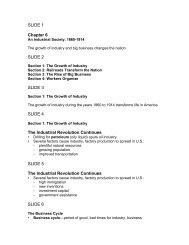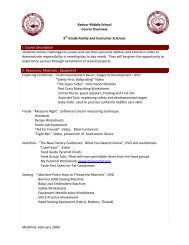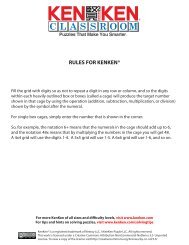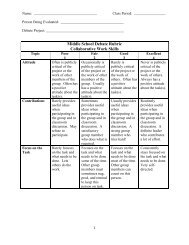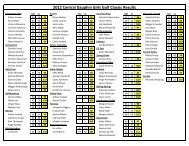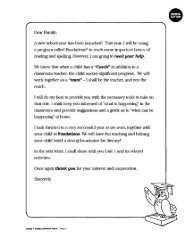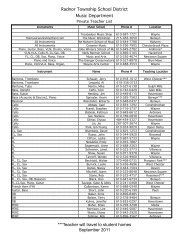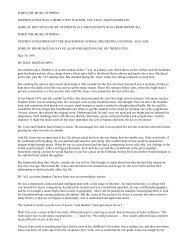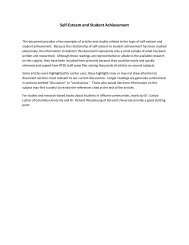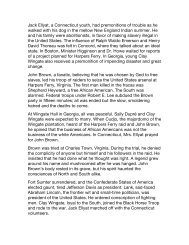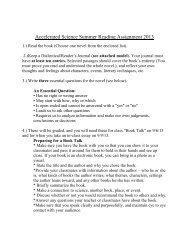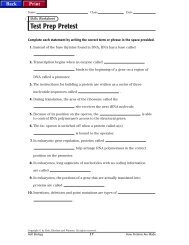Entrepreneurship
Entrepreneurship
Entrepreneurship
Create successful ePaper yourself
Turn your PDF publications into a flip-book with our unique Google optimized e-Paper software.
Discussion and Analysis:1. What is an entrepreneur? What do entrepreneurs do and why do they do it?2. Why are so many inventions developed in the United States?3. What does the term “business-friendly state” mean? Why might entrepreneurs want to pick business-friendlystates to start their businesses?4. How could government regulations make it more difficult for businesses to open and succeed?5. Some government regulations might lead to the unintended consequences of fewer businesses opening.Are there any times when those might be intended or intentional consequences? If so, whywould the government want to limit new businesses?6. Based on the video and on your own knowledge, who are some successful entrepreneurs who metwith failure early in their careers?7. Why would venture capitalists step in and loan money to a startup business when banks have decidedthat loaning money to that startup business is too risky?8. Is being in business respectable in America? Why / Why not? Does it depend on the business? Whatbusinesses might not be respectable? Why are they successful?9. Why would France regulate their successful wine business, by allowing government to decide whichgrapes can be grown, how they can be pruned, when they can be irrigated, and when the grapescan be picked? Why does government regulate? Do government officials think they can knowbetter than producers and consumers? Do they know better? Why / Why not? Do you think thisregulation could account for sales of French wines to drop while sales of American wines haveincreased?10. How are jobs created? Is there a connection between businesses starting up and the number of jobsavailable? Is there a connection between businesses failing and the number of jobs? Should thegovernment try to keep businesses from going broke? If so, how? Does bailing out losing companieshelp the economy or just make it tougher for successful companies to compete?11. How does society benefit from entrepreneurship?Discuss These Lines from the Video:1. But compared to all the other countries in the history of the world, America is rich.2. America is a society built on entrepreneurship.3. The right that is emphasized in the original Constitution is not free speech and it’s not the right topractice your religion, it’s the right to have patents and copyrights. And I think that helps explainwhy so many inventions come out of America.4. I found in England if there’s 10 reasons you could do something, there’s 20 reasons why you couldn’tdo it, you shouldn’t do it.5. I picked Delaware because we were told Delaware and Nevada have more business friendly laws.6. The fastest growing parts of the world, like Hong Kong, make entrepreneurship easy.7. In France, which built the wine business, government now decides which grapes can be grown, howyou may prune them, when you may irrigate, when you can pick grapes.8. Thomas Edison had more than 1,000 patents. We know about his successes like the light bulb, butfew people know that Edison failed much more often. He was fired by the telegraph office, and helost money on a cement company, and an iron business.9. There’s something in the American temperament that says you know, “Gosh, I lost seven times butthat’s okay.” And I think that that’s a resiliency of the American spirit.43
Quotes for Discussion:Entrepreneurial profit is the expression of the value of what the entrepreneur contributes to production.—Joseph A. SchumpeterFreedom of enterprise was from the beginning not altogether a blessing. As the liberty to work or tostarve, it spelled toil, insecurity, and fear for the vast majority of the population. If the individual wereno longer compelled to prove himself on the market, as a free economic subject, the disappearance ofthis freedom would be one of the greatest achievements of civilization.—Herbert MarcuseThe only place where success comes before work is in the dictionary.—Vidal SassoonI did something that challenged the banking world. Conventional banks look for the rich; we look forthe absolutely poor. All people are entrepreneurs, but many don’t have the opportunity to find that out.—Muhammad Yunus, Nobel Prize winner who founded Grameen Bank,which makes small loans to poor BangladeshisThe important thing is not being afraid to take a chance. Remember, the greatest failure is to not try.Once you find something you love to do, be the best at doing it.—Debbi Fields, founder of Mrs. Fields CookiesEvery worthwhile accomplishment, big or little, has its stages of drudgery and triumph; a beginning, astruggle and a victory.—Mahatma Gandhi, political and spiritual leaderWhen you reach an obstacle, turn it into an opportunity. You have the choice. You can overcome and bea winner, or you can allow it to overcome you and be a loser. The choice is yours and yours alone.Refuse to throw in the towel. Go that extra mile that failures refuse to travel. It is far better to be exhaustedfrom success than to be rested from failure.—Mary Kay Ash, founder of Mary Kay CosmeticsThe entrepreneur in us sees opportunities everywhere we look, but many people see only problemseverywhere they look. The entrepreneur in us is more concerned with discriminating between opportunitiesthan he or she is with failing to see the opportunities.—Michael Gerber, author, entrepreneurThe critical ingredient is getting off your butt and doing something. It’s as simple as that. A lot of peoplehave ideas, but there are few who decide to do something about them now. Not tomorrow. Not next week.But today. The true entrepreneur is a doer, not a dreamer.—Nolan Bushnell, founder of Atari and Chuck E. Cheese’sI never perfected an invention that I did not think about in terms of the service it might give others.... Ifind out what the world needs, then I proceed to invent.—Thomas EdisonI had to make my own living and my own opportunity! But I made it! Don’t sit down and wait for theopportunities to come. Get up and make them!—Madam C.J. Walker, creator of a popular line ofAfrican-American hair care products and America’s first black female millionaireEntrepreneurs are risk takers, willing to roll the dice with their money or reputation on the line insupport of an idea or enterprise. They willingly assume responsibility for the success or failure of aventure and are answerable for all its facets.—Victor Kiam, best known for his“I liked it so much, I bought the company” ads for Remington electric shavers44
Savor the Success, a business network for women entrepreneurs:http://www.savorthesuccess.comLists of EntrepreneursFamous entrepreneurs:http://cecteachers.dpsk12.org/stories/storyReader%2475The top 20 entrepreneurs of the last 100 years:http://www.focus.com/fyi/other/top-entrepreneurs-last-100-years/BooksWhat’s So Great About America, by Dinesh D’SouzaThe Myth of the Robber Barons, by Burton FolsomEmpire Builders: How Michigan Entrepreneurs Helped Make America Great, by Burton FolsomFamily Pride: Profiles of Five of Americas Best-Run Family Businesses, by Thomas Goldwasser47
Name ____________________ Date ____________________Class ____________________ Teacher _________________Entrepreneurs - Matching ActivityDirections: Match the entrepreneurs in the left column with their accomplishments in the right column.________________________________________________________________________________1. Benjamin Franklin2. Oprah Winfrey3. Alvin Ailey4. Thomas Edison5. Madame C.J. Walker6. Bill Gates7. Andrew Carnegie8. Coco Chanel9. Ray Kroc10. Estee Lauder11. Henry Ford12. John D. Rockefeller13. Michael Dell14. Debbi Fields15. Sam Walton16. Jeff Bezos17. Pierre Omidyar18. Phil Knight19. Anita Roddick20. Robert L. JohnsonA. Began baking chocolate chip cookies, established a dessert franchise with over 600 U.S. stores.B. Founded a dance theatre to educate and bring African-American cultural expression to the world.C. High school dropout, sold milkshake machines, turned McDonald’s into the top fast food business.D. Women’s fashion innovator, whose signature fragrance, begun in 1923, is still a top seller.E. Earned a journalism degree and an MBA; distributed Tiger running shoes; co-founded Nike.F. Has bachelor’s and master’s degrees; Founded BET; first African-American billionaire.G. Built a beauty products business and became the first self-made African-American millionaire.H. Revolutionized the petroleum industry; created Standard Oil; greatly reduced costs to consumers.I. Graduated with degrees in computer science and electrical engineering, founded Amazon.com.J. Avid reader as a boy; became the largest producer of American steel; established many libraries.K. Founded The Body Shop, which has over 2,500 stores selling natural beauty products.L. Wrote the original computer code for and then founded what became the auction website eBay.M. Scored 1590 out of 1600 on the SATs; created the world’s best-known software company.N. Sold newspaper subscriptions in HS, college dropout, produces and sells PCs directly to customers.O. Talk show host, magazine publisher, first African-American woman to become a billionaire.P. Began selling skin creams created by an uncle, now has a 45% share of the cosmetics market.Q. Used the assembly line to produce autos, his goal was to produce the lowest-priced quality car.R. Developed the lightning rod, bifocal glasses, and an improved wood stove that bears his name.S. Invented the phonograph and motion picture camera, and patented the incandescent lamp.T. Worked for JC Penny as a trainee; opened first store 7/2/62; now over 8,500 stores in 15 countries.



